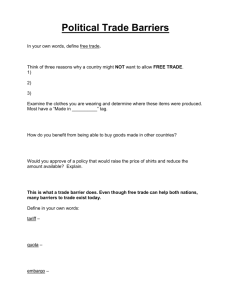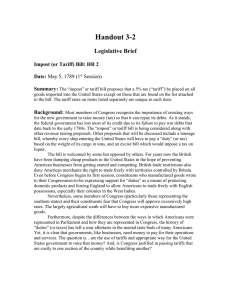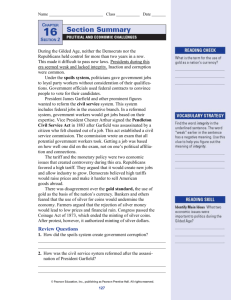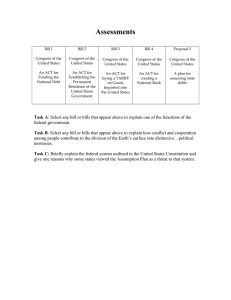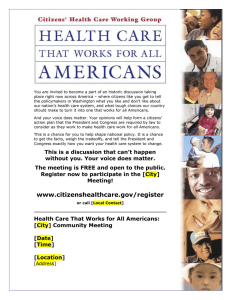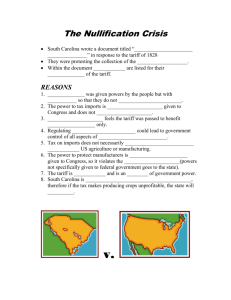Politics and Government, 1877-1900 Lecture/Reading Notes 2 (p. 116-122)
advertisement
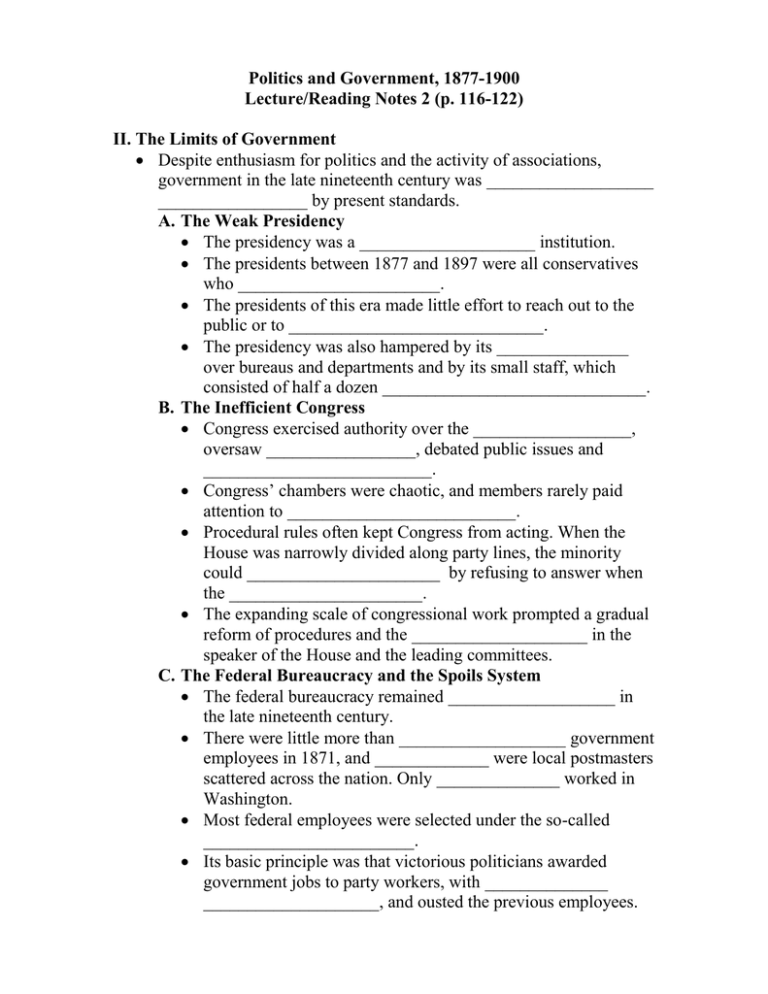
Politics and Government, 1877-1900 Lecture/Reading Notes 2 (p. 116-122) II. The Limits of Government Despite enthusiasm for politics and the activity of associations, government in the late nineteenth century was ___________________ _________________ by present standards. A. The Weak Presidency The presidency was a ____________________ institution. The presidents between 1877 and 1897 were all conservatives who _______________________. The presidents of this era made little effort to reach out to the public or to _____________________________. The presidency was also hampered by its _______________ over bureaus and departments and by its small staff, which consisted of half a dozen ______________________________. B. The Inefficient Congress Congress exercised authority over the __________________, oversaw _________________, debated public issues and __________________________. Congress’ chambers were chaotic, and members rarely paid attention to __________________________. Procedural rules often kept Congress from acting. When the House was narrowly divided along party lines, the minority could ______________________ by refusing to answer when the ______________________. The expanding scale of congressional work prompted a gradual reform of procedures and the ____________________ in the speaker of the House and the leading committees. C. The Federal Bureaucracy and the Spoils System The federal bureaucracy remained ___________________ in the late nineteenth century. There were little more than ___________________ government employees in 1871, and _____________ were local postmasters scattered across the nation. Only ______________ worked in Washington. Most federal employees were selected under the so-called ________________________. Its basic principle was that victorious politicians awarded government jobs to party workers, with ______________ ____________________, and ousted the previous employees. Critics charged that the system was ________________, abuse, and inefficiency. Rapid turnover bred ______________; political favoritism bred ___________________. D. Inconsistent State Government Considered closer and more responsible to the people, state governments had long exercised ________________________ __________________. They collected _________________________________, and they promoted __________________________________. State governments gradually expanded their role in response to the stresses produced by ______________________________. The widening scope of state action represented a growing acceptance of _____________________ for social welfare and _____________________. III. Public Policies and National Elections Several great issues dominated the national political arena in the late nineteenth century. Rarely did these issues clearly and consistently separate the major political parties. E. Civil Service Reform Reform of the ________________ emerged as a prominent issue during the ______________________. Reformers like the Mugwumps wanted professional civil service based on ________________ from politics. 1. The assassination of James Garfield Garfield won the 1880 election and immediately found himself immersed in the demands of an ______________ _____________________. Within a few months of his inauguration in 1881, Garfield was ________________ by a disappointed and crazed office seeker. 2. The Pendleton Civil Service Act This measure prohibited federal employees from ___________________ political contributions from government workers and created the Civil Service Commission to administer _______________________ to applicants for government jobs. The new emphasis ___________________ rather than ________________ opened new opportunities to women. By the early 1890s, women held a _______ of the clerical positions in the executive departments in Washington. F. The Political Life of the Tariff 1. Tariff reform in the 1884 and 1888 presidential elections Tariffs on imported goods provided __________ for the federal government and _________________________ from European competition. By the 1880s, separate tariffs covered more than _______ thousand items and generated more revenue than the government needed to carry on its limited operations. Reflecting its commitment to industry, the ___________ _____________vigorously championed protective tariffs. Most ___________ favored _____________. They argued that lower tariffs would encourage foreign trade and, by reducing the treasury surplus, minimize the temptation for the government to pursue activist policies. Regardless of party position, congressmen of both parties voted for tariffs that would _____________________. In the 1884 campaign, Republican presidential candidate _____________________ maintained that prosperity and high employment depended on high duties. The Democrats’ platform endorsed a ______________, but their candidate, ________________, generally ignored the issue. In 1888, Cleveland proposed a Democratic platform that __________________________ attacking the tariff and didn’t even use the word tariff. 2. The McKinley Tariff Act of 1890 The triumphant Republicans __________ tariffs to unprecedented levels with the ____________________ _________. The law provoked a popular backlash that helped return the __________________________. G. The Beginnings of Federal Regulation 1. The Interstate Commerce Act Farmers ___________________ of corporations over transportation facilities and their _________________ ________________ affecting agriculture, from those that manufactured farm machinery to those that ran flour mills. The first target of this concern was the nation’s _______, the preeminent symbol of big business. Both farm groups and businesses complained of discriminatory shipping rates. Consumers condemned the railroads’ use of ___________________________ to suppress competition and raise rates. In 1886, the Supreme Court ruled in Wabash, St. Louis, and Pacific Railway Company v. Illinois that only the _____________________ could regulate interstate commerce. This decision effectively ended state regulation of railroads but _____________________ for congressional action. With the support of both major parties, Congress in 1887 passed the _____________________. The act prohibited rebates, discriminatory rates, and pooling and established the _______________________ _________(ICC) to investigate and prosecute violations. The ICC was the first federal regulatory agency, but its powers ____________________________. 2. The Sherman Antitrust Act Exposes of the monopolistic practices of such corporations as Standard Oil forced both major parties to endorse ___________________________. In 1890, Congress enacted the ____________________ with only a single vote in opposition. Although it emphatically prohibited any combination in restraint of trade it was _______________________ in its ability to prevent abuses. H. The Money Question 1. The sound money policy Creditors, especially bankers, as well as conservative economists and many business leaders favored ________ ____________________. They called this a _________________ and insisted that it would ensure economic stability, maintain property values, and retain investor confidence. 2. The inflationary monetary policy Farmers and other debtors feared that the sound money policy would depress already low crop prices, drive debtors further into debt, and ___________________ ____________________. They favored _________________________ to match the country’s growing population and economy. They expected this inflationary policy to ____________, stimulate the economy, ____________________, and increase opportunities. 3. Legislation addressing the money issue The conflict between advocates of sound money and inflation centered on the use of paper money“__________________”-and silver coinage. In 1875 sound money advocates in Congress enacted a deflationary law that ____________________ from circulation and required the remainder be convertible to gold after 1878. Historically, the United States had used both __________ ___________ as the basis of its currency, but in 1873, Congress passed a law “demonetizing” silver, making gold the only standard for American currency. Silver production soon boomed, flooding to commercial market and ________________________. Eastern conservatives of both parties denounced silver: Southerners and Westerners demanded ____________, which meant ____________________. By 1878, a bipartisan coalition succeeded in passing the _______________________, requiring the government to buy at least $_____________ of silver a month. As hard times it rural regions in the late 1880s, inflationists secured the passage of the ______________ _____________________. The treasury now had to buy more silver and pay for it with Treasury notes redeemable in either gold or silver. Neither of these laws had very much inflationary effect. Debtors of both parties remained convinced that the government favored the “________________________.”
